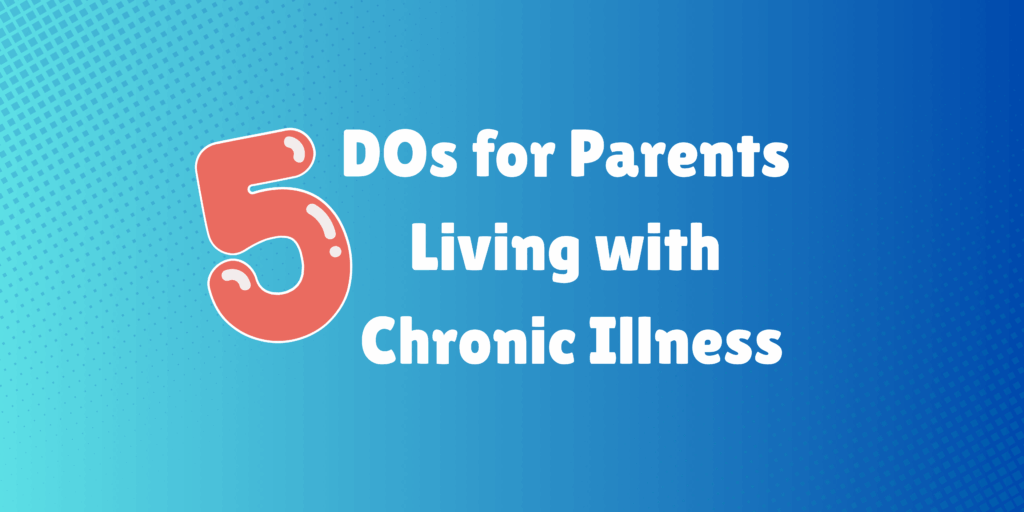Those of us who are parents to young (and older) children know that this role brings with it much joy and many challenges. Those of us who are also living with chronic illness or disability know that we often face an extra layer of challenge compared to other parents.
As a person who has lived with multiple chronic illnesses (inflammatory bowel disease or IBD and ankylosing spondylitis or AS) since before my children were born, I have a few DOs that I’d like to pass on in hopes that these might help or resonate with you as you prepare for or continue your parenting journey.
1. DO talk with your children about experiences, thoughts, and feelings
When my children were four and seven, I was hospitalized for ten days in a different city for a flare of my IBD. While I was in the hospital, and after I returned, we didn’t discuss our feelings about the experience because my husband and I thought that this would be best in terms of helping the girls to move on and forget. However, not discussing the experience had the opposite effect wherein our girls continued to worry that I’d return to the hospital each time I left the house or felt unwell.
After meeting with a counselor, we learned about the importance of discussing difficult experiences as a means for helping kids to process trauma. My husband and I then asked our children how they felt when I was gone, what they remembered, and whether they had any questions. The kids were very open, and after discussing the experience a few times, their worries over the potential of me leaving decreased. Given that my hospital stay occurred over six years ago and the kids still occasionally bring it up, I believe that they find comfort in these discussions.
Providing kids with opportunities to ask questions and to share their thoughts and feelings about tough experiences allows them to process distressing events and is something that certainly helps my own children.
2. DO eat what works for you and your family.
Having lived with a digestive disease for almost twenty years, I’ve tried a LOT of diets.
The first year after my IBD diagnosis, I spent weekends sourcing organic coconut milk, tapioca flour, and stevia. I went gluten-free, sugar-free, dairy-free, and soy-free. It was time-consuming, expensive and exhausting! Eventually, I admitted that this approach didn’t significantly improve my symptoms, nor did my days of surviving on cabbage juice alone!
With a family, one needs to balance everyone’s health and tastes along with time, money, and energy. Some people have success with specialized diets or supplements, and if you have found something that helps then that’s wonderful and worth continuing. Personally, I’ve never found any foods or supplements that significantly calm my inflammation and symptoms. What works best for my family is a simple healthy diet (lean meats, cooked veggies, fruits, whole grains) and avoiding or limiting a few personal triggers.
For me, following a limited diet added significant stress, time-constraints, and financial strain, which in turn may have exacerbated my health issues further. Please do whatever works best for you while keeping it simple.
3. DO recognize the upsides of parenting with chronic illness.
When my children were tiny, caring for them was sometimes physically difficult between joint flares, pain, trips to the bathroom, and frequent appointments. I didn’t believe there was anything good about parenting with chronic illness. However, as my girls grew, I started noticing some upsides!
Watching me accept care and support from others plus seeing the challenges faced by people in the chronic illness community has developed kindness and empathy in my children. They are quick to offer help, share with others, and are mindful about inclusion.
Some of the things I do to care for myself includes working part-time rather than full-time, walking, strength training, and eating healthfully. I’m thrilled that my girls are beginning to incorporate positive self-care habits into their days as well.
Living with chronic illness often means that plans change when illness flares. My children are disappointed when activities are canceled or altered, but this provides them practice with flexibility and resilience.
If you haven’t yet, try thinking about the positive aspects or benefits you’ve experienced from parenting with chronic illness. I hope you’ll find it to be uplifting.
4. DO find a creative passion.
For years, I didn’t pursue creative activities as it was easy to keep busy as a teacher, mom, and chronic illness warrior. However, there came a low point where I needed something to fill me up creatively and so I turned to writing picture books. Writing keeps me busier than ever but provides me with a fulfilling focus and an outlet for thoughts and feelings. I also sometimes write stories that feature chronic illness, and this allows me to create while also working through tough emotions and memories.
If you aren’t carving out time for creativity, then do give it a try, as it offers many benefits! Being creative can help manage stress, boost your mood and immune system, improve cognitive function and problem-solving skills, and provide opportunities to express yourself, among other things.
Even if you’re low on time, there are quick things you can do to fill your creative bucket such as making up songs, dances, and stories with your kids, rearranging a room, doodling or drawing, crafting, cooking, taking pictures, or creating digital art. There are so many possibilities!
5. DO use the skills you’ve gained from chronic illness in your parenting.
Being chronically ill is tough, and the challenges faced often help in cultivating skills and strengths. For example, I’ve improved my problem-solving skills and resilience over the years when tackling challenges like switching medications, dealing with side effects, and navigating diet and alternative therapies. I’ve also had to practice patience in dealing with flares and taking things more slowly when my body is in pain or healing.
The skills you’ve learned from a life with chronic illness are transferrable skills that you can use for parenting. Your child won’t sleep? Won’t eat veggies? Use your problem-solving skills! Tantrums? Arguing? Pull out those patience skills!
Think about what skills you’ve gained and how you can transfer these to your most rewarding job: parenting!
Remember that everyone’s experience with chronic illness and disability is unique, and changes over time, so always DO what works best for you and your family.

